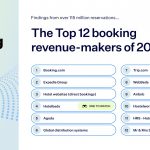The skills required to succeed in hotel group, event, and BT sales are going to be hugely different here in 2023, but the disruptions that have caused these changes began much earlier.
NB: This is an article from Kennedy Training Network
Traditionally, succeeding in hotel sales was more about personality than process. Target rates were locked-in well ahead of time and fees were few, so negotiations were much simpler. A focus on filling the house made it easy to get concessions approved, but since most planners and BT buyers were novices, they weren’t asking for that much anyway.
Subscribe to our weekly newsletter and stay up to date
Closure rates on inbound leads were much higher, because initiating an inquiry required more effort, such as calling a hotel or locating its “sales@” email address and sending RFP’s one at a time. Back then, one piece of business generated only a few hotel sales inquiries.
Prospecting? With 10 or more years of an up market from 2009 – 2019, it was easy to meet sales goals based on inbound alone, but if a GM or DOS required their staff to prospect, most salespeople could get away with firing-off a designated quota of emails or making a designated number of calls, targeting randomly selected “sales suspects” who were not necessary even qualified leads.
Changes were insidious over the last decade, constantly chipping away at outdated sales models, and affecting all aspects of hotel sales process. Increasingly, leads more often arrived electronically, as a result of the evolution of platforms for planning meetings and events, and for locating suppliers for high volume business travel. Soon, with a few clicks on a keyboard or taps on a smartphone, buyers visiting Hotel Planner, CVENT, or Lanyon, could issue an RFP to a long list of hotel sales offices. Similarly, those planning weddings or social events could visit The Knot or Wedding Wire and send inquiries to dozens of hotel venues. As a result, today’s salespeople are fielding an overwhelming flood of leads, while the chances of converting any one lead has dropped into single digits.
As the profession of revenue management evolved, along with the tech platforms and data points that drive it, pricing decisions moved out of realm of the sales department, sometimes to be made by RM who does not fully appreciate the long term value of potential new client company or organization, or who might only obsess on RevPar and not total guest spend.
Also on the technology side, sales lead tracking systems that were originally developed by providers who were fully emersed in the needs of hotel sales got rolled-up into tech stacks that added feature after feature, which no one was asking for, few needed, and even fewer learned how to use. The most important features that hotel salespeople truly need to use to organize a tenacious, personalized follow-up process are now buried so deeply into sales CRMS that they have effectively disappeared. Incredibly, based on the hotel sales process evaluations I conduct for our training clients, most hotel salespeople have reverted either old-school paper trails, or are attempting to manage sales leads by using Outlook calendar appointments or by flagging emails in an over-stuffed inbox.
Prospecting itself has changed too. In the past, hotels held sales blitzes and sent teams out into the neighboring office buildings to knock on doors, hand out food and logo items, and make connections. Now, most of the office buildings themselves require security access, and the doors to the individual offices are locked. The receptionist staffing the buzzer is now a Ring doorbell, and with so many working from home there’s often no one not meet with anyway.
The buyers have also changed. On the group and BT side, the profession of being an independent meeting planner or BT consultant grew exponentially, often staffed by people who were formerly among the roster of top hotel sales producers. Now experienced “buyers” will routinely tell novice hotel salespeople things like “Here’s how to sell our deal to your revenue manager…” On the social, event and wedding event side of the business, the profession of wedding planner has also emerged. What was only a few years ago a resource used mainly by those planning destination weddings, is now a resource that even those on modest budgets can utilize.
Site tours? With so many images, reviews and virtual tours being online, and with third-party buyers being located remotely, it became ever harder to convince decision makers to visit in person.
So, what have hotel companies done so far to response to these changes? In my opinion, manly all the wrong things, such as centralize and automate.
Increasingly, hotel management companies and brands have created cluster or regional sales offices, staffed by remote sales teams located far away who can rarely visit in person. Although this could arguably bring some efficiencies, gone are the passionate, emotional commitments between a salesperson, their hotel, and their hotel’s frontline staff, which cuts both ways. Remote salespeople at regional offices are tempted to cross-sell out of the originally requested property when enticed by incentives, even if it does not make sense for the buyer. Likewise, on-site operations staff may be less passionate about servicing a buyer’s special needs that were committed to by a salesperson he or she have never met in person.
Similarly, hotel leaders are looking to automation and the “self-service” booking of small groups and room blocks, a feature being provided by online hotel tech companies serving multiple brands in the same market. Have we learned nothing from the mistake made during the early 2,000s of turning over transient demand to OTA channels? If rates for meeting rooms, event space, basic F&B, and rooms for all the a hotel’s comp-set show up transparently on one platform, will that lead to the further commoditization and “vanillaization” of this industry?
Well, I am now more than halfway to the target word count of this article, so let’s now take a look at the solutions to these challenges and explore what everyone from the top-tier hotel leaders to the most novice hotel salespeople can do to succeed in 2023 and beyond.
Reinvent The Lead Intake Process
Hotels with larger sales teams should establish a centralized role of “sales lead catcher” who can sort and prioritize leads, keeping salespeople focused more on the hottest leads, while responding to even the seemingly “weakest” leads. As an example, these days too many inquiries which are for dates that are sold-out are ignored, especially if the lead sender indicates that dates are not flexible. Yet when that same prospect finds all hotels are sold-out and is therefore forced to become date-flexible, salespeople who have sent a courteous response will stand-out.
Cross-Train Hotel Sales and Revenue Managers
By training hotel salespeople on the formulations, data points and RM systems which revenue managers use, and by training RM’s to better understand the group and BT markets, parties on both sides will make better decisions together.
Hotel salespeople will embrace their role in getting prospects to move dates, while being able to truly support the concept of dynamic pricing for BT accounts.
Embrace Your Sales CRM
Having had hotel sales training clients that use virtually all available systems, it seems to me that core problem is not so much what sales CRM is in use, but rather a) how it has been configured and b) how well the staff has been trained. The solution starts with whomever the systems administrator is. The top-level sales leaders need to work closely with IT to ensure that all default features have been properly configured or deactivated. One basic example is to look at what “auto-tasks” are generated when a lead is turned definite. Often, I find that the default settings are unchanged, triggering a flood of tasks that clutter-up on a salesperson’s to-do list and drive them back to a manual process. It is also important that salespeople carve out time to use all available online training and to read through FAQ’s.
An even more foundational solution is that sales leaders need to personally ensure that all salespeople can use their CRM to do the very most important sales tasks:
– Enter all leads into the CRM. Increasingly, electronic leads (such as through CVENT and The Knot) come in seamlessly, but email and phone inquiries all need to be entered as leads. If the requested dates are sold-out, and if the lead is truly “right sized,” it should still be entered and then “declined” or “turned-down” for future revenue management tracking purposes.
– Attach all emails to the contact record, or if that is not possible, to copy/paste details from key email exchanges.
– Enter notes from phone calls or in-person conversations.
– Trace the next step in a proactive sales process, such as to confirm receipt, then to follow-up a few days after the proposal or contract was sent.
Review And Update Proposal Templates
Hotel sales leaders should check the actual overall responses which salespeople are sending to ensure they are not simply posting bids or issuing basic responses in online platforms, or just sending quotes in an email with a contract as an attachment.
It is also important to check the basic proposal templates being used, whether in WORD/PDF format or in “electronic” proposals. Make sure all the copy and images are updated, and especially that salespeople are personalizing the details by deleting content that is irrelevant.
Put The “People” Back Into Sales Process
Train salespeople to do more than just reply with an email, in-app message, or platform bid. Pick-up the phone, even if only to leave a personalized voicemail. Follow-up at least three times on every “right sized” lead, alternating between calls and emails.
Encourage A “Tech for Touch” Approach
Train salespeople to use technology in a way to enhance and not to replace conversations. Use online scheduling apps (such as Calendly) to make it easy for buyers to pick a time to meet. Switch voice calls to Zoom whenever possible and turn on the webcam when doing so! Send short, personalized video email messages to “put a face with a name.” Practice, practice, practice using all these mediums. As we have found out by conducting sales coaching for dozens of hotel salespeople, flipping on a webcam may be simple, but truly mastering these mediums makes the difference.
Prospecting: Research Before You Reach Out
Rather than setting a “quantity” of outbound sales efforts, train your team to research before they reach out, therefore enabling “warm calling” vs. “cold calling.” Personalize reach-outs by mentioning what you have learned and why you think they might be a prospect before you tell them how you can “help fill their needs.” Again, the tech for touch approach which puts people and relationships back into sales prospecting will pay huge dividends.
Certainly, 2023 and the years stacked-up right behind it hold significant challenges, and additional changes which have not even been imagined yet loom on the horizon for the second half of the 2020’s. However, one thing is true. The job of “sales fishing,” which is to say responding to inbound leads attracted by the digital “bait” at the end of the hooks floating around the internet will become increasingly centralized, automated and will devolve into a more administrative type role. However, salespeople who pull on their orange vests and embrace a role as “sales hunters” will increasingly thrive and find their careers soaring to the top of the best org-charts.
Read more about Kennedy Training Network
The post What Will It Take To Succeed In Hotel Sales In 2023? appeared first on Revenue Hub.
































